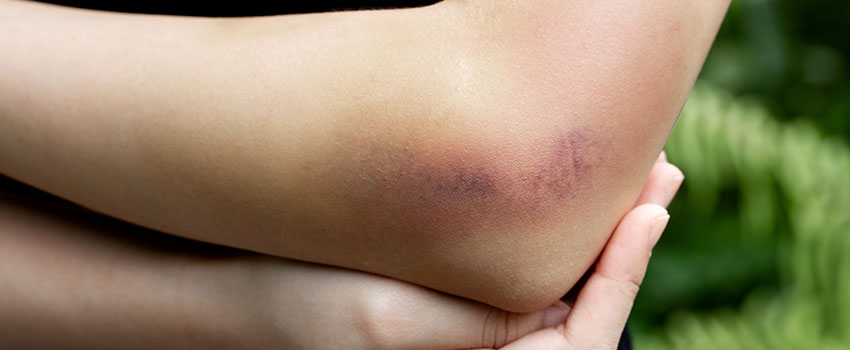
You’re walking around the home and knock your knee into something you didn’t see; a bruise shows up a day later as a reminder of your clumsiness. This is a common occurrence for many, but there are times when bruises show up and you don’t even remember how you got them. Should you be concerned?
Not usually, and our AFC Urgent Care Farragut team explains why below.
What Exactly Is a Bruise?
Bruises are common. When you bump into something or experience skin trauma, you may injure tiny blood vessels under the skin, which pop and cause blood to pool under the skin. This can cause a skin discoloration, which appears as a yellow, blue, black, brown, green or red bruise.
Bruises are treatable and not usually a cause for concern.
How to Treat Bruises
- Cold compress. If bruising has caused pain and swelling, applying a cold compress is step one. Remember to put a barrier, such as a towel or cloth, between the cold object and skin. Place the compress on your child’s skin for up to 20 minutes at a time.
- Elevation. If an arm or leg is involved, elevate the limb and apply a cold compress for 15 to 20 minutes at a time, or until the swelling is reduced.
- Over-the-counter medication, such as acetaminophen.
What Causes Frequent Bruising?
There are many possible causes. The leading cause could be that you are just an active human being, experiencing lots of bumps and bruises. Another explanation could be medication that you’re taking. Medications like aspirin, ibuprofen and blood thinners can get in the way of your body’s ability to form a clot.
For some, frequent bruising could be the result of a low amount of vitamin C. Vitamin C helps to make collagen, an important protein that keeps your blood vessels healthy. Without ample amounts of collagen, bruising could become more frequent. A low amount of vitamin C is rare, though, except for smokers. If you get a bruise, don’t worry, but consider reaching out to our AFC center if you experience the below-mentioned symptoms as well.
Additional Signs That Medical Care Is Necessary
- Rashes
- An enlarged abdomen
- Fever
- Sweating and/or chills
- Bone pain
- Facial abnormalities
If you believe the reason you are bruising often is because of a low blood or platelet count, visit our AFC center today to get a CBC test or blood panel.